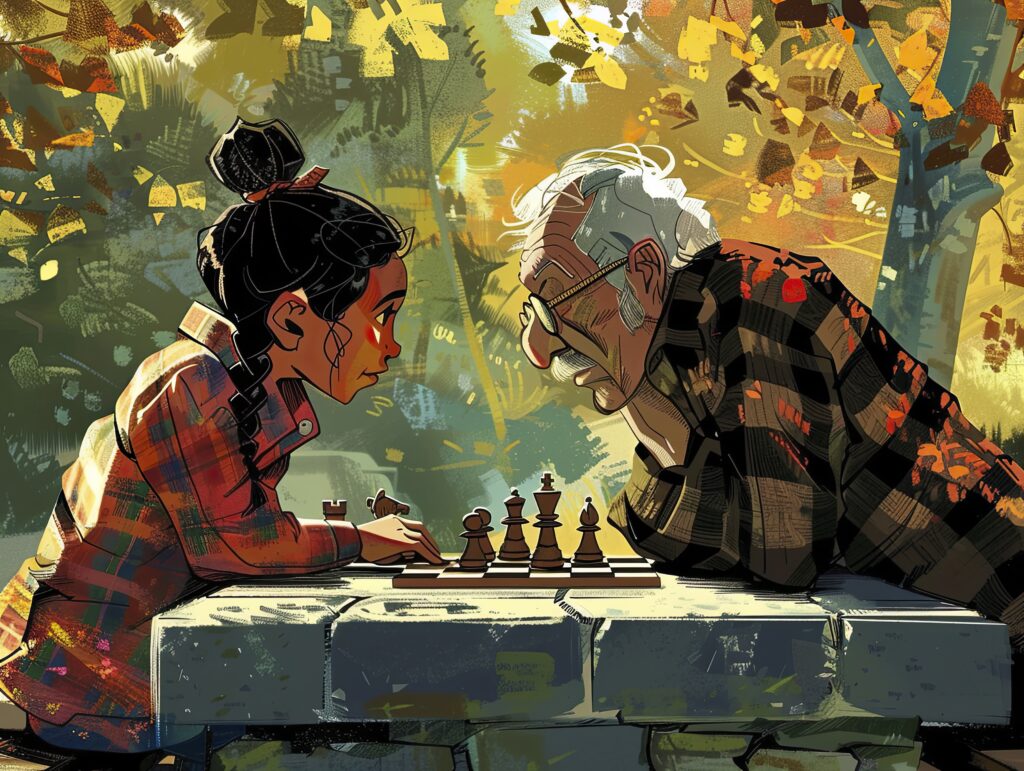Table of Contents
Game theory, often associated with intricate mathematical equations and abstract strategic scenarios, is deeply embedded in our daily lives. Non-cooperative games are where individuals make independent decisions to maximize their own benefit without binding agreements. From the morning commute to social media interactions, we engage in strategic decision-making that mirrors classic game theory concepts.
Understanding Non-Cooperative Games
Before delving into practical examples, it’s crucial to clarify the distinguishing factors between non-cooperative and cooperative games. In non-cooperative games, players are unable to establish binding commitments or enforceable agreements. Each player operates independently, prioritizing their own interests based on their assumptions about others’ actions. This doesn’t imply that players are inherently adversarial or selfish—it simply means that there are no mechanisms in place to ensure cooperation through external enforcement.
The most renowned illustration of this concept is the Prisoner’s Dilemma, where two individuals must make a choice between cooperation and defection without any communication. Although both would gain from mutual cooperation, the rational decision for each individual results in a worse outcome for both parties. This paradox frequently arises in real-world scenarios.
The Morning Commute: A Traffic Game
Every morning, millions of people engage in one of the most noticeable non-cooperative games: choosing their route to work. Each driver selects a path they believe will get them to their destination the fastest, taking into account factors such as distance, typical traffic patterns, and road conditions.
This scenario exemplifies Braess’s Paradox, a phenomenon where adding a new road to a traffic network can paradoxically increase congestion and travel times for everyone. This occurs because individual drivers make independent route optimizations without considering the collective impact, leading to a suboptimal outcome. This is a characteristic of non-cooperative games, where rational individual choices result in an overall inefficient collective outcome.
During rush hour, you’re faced with a constant strategic dilemma: stick to the main highway, where you can maintain a steady speed but might encounter heavy traffic, or take side streets with frequent stops but potentially less congestion. Your decision depends partly on your anticipation of other drivers’ actions. If everyone believes the side streets are a clever alternative, they quickly become just as congested as the highway. Since there’s no binding agreement forcing drivers to distribute themselves evenly across available routes, the system tends toward inefficient equilibrium states.
The Tragedy of the Commons in Shared Spaces
Public resources are another classic non-cooperative game scenario. For instance, consider a shared office kitchen or a communal apartment laundry room. While everyone benefits from these spaces remaining clean and organized, each individual faces a personal dilemma: invest time and effort in maintaining the space or let the mess accumulate for others to deal with.
The “tragedy of the commons” arises because the cost of cleaning falls solely on the individual responsible, while the benefits are shared among all users. Rationally, each person might believe that their individual mess has a negligible impact on the overall condition, and that someone else will likely clean it up anyway. When everyone independently follows this logic, the shared resource deteriorates.
The same dynamic occurs in apartment buildings with shared amenities. Gym equipment remains uncleaned, pool areas accumulate towels, and common gardens become overgrown. This isn’t because residents are inherently irresponsible, but because the game structure encourages free-riding behavior when there are no enforceable mechanisms for cooperation.
Social Media Engagement: The Attention Economy
Social media platforms have introduced innovative non-cooperative games centered around attention and engagement. When you post content, you’re competing with millions of other users for the limited attention of your followers, which creates several intriguing strategic dynamics.
The timing of your posts becomes a strategic decision. You can post when everyone else is active, but your content will likely be buried. Alternatively, you can post when few others are active, reducing competition but also limiting the number of people who can see your content. Unfortunately, there’s no coordination among users about optimal posting times, as everyone independently tries to maximize their visibility.
Content strategies also reflect non-cooperative game dynamics. Provocative or controversial posts often receive more engagement, creating incentives for increasingly sensational content. Each user rationally seeks to stand out in a crowded information landscape, but when everyone employs attention-grabbing tactics simultaneously, the overall discourse becomes more polarized and less substantive. The platform itself becomes a non-cooperative game where individual optimization leads to collective outcomes that many users find unsatisfying.
The Office Thermostat Wars
In shared workspaces, climate control often becomes a subtle yet persistent non-cooperative game. Individuals have varying temperature preferences, but there’s usually only one thermostat setting that applies to everyone. Without formal procedures for determining the setting, people engage in an ongoing strategic interaction.
Those who prefer cooler temperatures might discreetly lower the thermostat when others aren’t looking. Conversely, those who feel cold respond by raising it again, possibly even overshooting to compensate for anticipated future adjustments. Some players employ more sophisticated strategies, such as adjusting the temperature late in the day when they’ll be the last ones in the office, or claiming they need a specific temperature for medical reasons to gain a strategic advantage.
This game persists because there’s no binding agreement on the optimal temperature, and enforcing such an agreement is impractical. Consequently, we often end up with an inefficient equilibrium where everyone is moderately dissatisfied, and time is wasted on ongoing thermostat battles.
Parking Spot Selection: A Coordination Problem
The seemingly simple act of choosing a parking spot involves game theory. In a crowded parking lot, you must decide whether to circle for a close spot or take one farther away immediately. Your decision is influenced by your expectations of other drivers’ actions.
If most drivers circle for close parking spots, those areas become congested, and the time saved by proximity is lost to searching. However, if everyone immediately took distant spots, close spots would be readily available. Without communication or coordination, drivers must independently guess at the strategies of others.
During peak times like holiday shopping seasons, this game becomes more intricate. Some drivers resort to aggressive tactics, such as circling repeatedly or tailgating shoppers returning to their cars. Others, seeking to avoid the stress, opt to park far away. Unfortunately, the system lacks a cooperative mechanism to efficiently allocate parking spots, resulting in wasted time and fuel.
Restaurant Reservations and Overbooking
When popular restaurants open their reservation systems, a non-cooperative game continues. Diners who genuinely desire a table might make multiple reservations at different restaurants for the same evening, intending to cancel the ones they don’t use. This strategy appears individually rational—it enhances the likelihood of dining at their preferred time and location.
However, when many diners adopt this strategy, restaurants end up with high no-show rates even when they appear fully booked. In response, some restaurants resort to overbooking, anticipating cancellations. This creates a feedback loop where diners make even more backup reservations to ensure they secure a table, leading restaurants to overbook more aggressively. Consequently, an inefficient equilibrium emerges, characterized by wasted resources—empty tables that could have been filled and disappointed diners who arrive to find their reservation was not honored.
This game structure exists because there’s no binding commitment mechanism. If diners had to pay deposits for reservations, cooperative behavior would be more easily enforced. However, without such mechanisms, individually rational strategies lead to collectively suboptimal outcomes.
The Coffee Shop Laptop Dilemma
In coffee shops that provide complimentary Wi-Fi, patrons engage in a subtle game of table occupancy. Students and remote workers seek extended work sessions, while the coffee shop aims to maximize sales by encouraging frequent turnover.
Each laptop user must strategically decide how long to occupy a table based on the value of their purchase. On the one hand, buying a small coffee and staying all day could lead to disapproval or being asked to leave. On the other hand, buying more than necessary just to maintain their spot seems wasteful. Each person makes this calculation independently, without coordination with others.
The shop owner employs strategic maneuvers, such as enforcing time limits, removing power outlets, or eliminating comfortable seating, to address the free-rider problem. These decisions impact customer experience but ultimately shape the evolving game of norms, as different players respond to each other’s strategies.
Grocery Store Express Lane Cheating
The express lane at grocery stores, usually reserved for customers with fifteen items or fewer, presents a game scenario. While everyone benefits from adhering to the rule, individuals with sixteen or seventeen items are tempted to violate it, saving time for themselves at the expense of others waiting behind.
Most express lane cheaters likely rationalize that their actions are insignificant and won’t significantly affect others. While this might be true for a single violator, when many shoppers independently make this calculation, the express lane loses its efficiency advantage. The system relies on voluntary compliance.
Email Response Timing
In professional settings, the timing of email responses reveals non-cooperative game dynamics. Responding too swiftly may indicate disinterest or lack of importance, while responding too slowly can appear unresponsive or disrespectful. Without explicit agreements on response time expectations, professionals must independently strategize to navigate these dynamics effectively.
Some individuals adopt deliberate delay tactics, believing that immediate responses may appear desperate or indicate a lack of status. Conversely, others respond swiftly to clear their inbox, even if it means projecting availability for additional requests. These individual strategies interact in intricate ways, influencing workplace communication norms and overall efficiency.
The game extends to the length and tone of messages. Writing excessively can make you seem like you’re wasting time, while writing too little can make you appear curt. Each person independently calibrates their communication style, creating emergent norms that no one explicitly chose but everyone must navigate.
Navigating Non-Cooperative Games
Recognizing non-cooperative games in everyday life doesn’t imply that you should always adopt purely selfish strategies. Instead, understanding these dynamics sheds light on why individually rational behavior can sometimes lead to collectively disappointing outcomes, and why certain social issues persist despite everyone’s best efforts.
Many of these games have emerged alongside the increasing complexity and anonymity of modern life. In small communities with frequent interactions, reputation and social pressure foster cooperation more effectively. However, in large, anonymous settings—ranging from highway traffic to social media platforms—non-cooperative game structures become more prevalent.
The positive aspect is that understanding these dynamics can lead to improved design. Mechanisms such as congestion pricing for roads, reputation systems for online platforms, and deposit requirements for reservations can shift incentive structures towards more cooperative outcomes. On an individual level, recognizing when you’re in a non-cooperative game can help you make more strategic decisions. The non-cooperative games that permeate our daily lives serve as a reminder that many social challenges transcend the simple dichotomy of good versus evil. Instead, they are intricately linked to incentive structures that mold our behavior.



Pingback: How Successful Businesses Use Non-Cooperative Game Theory - gametheorytimes.com